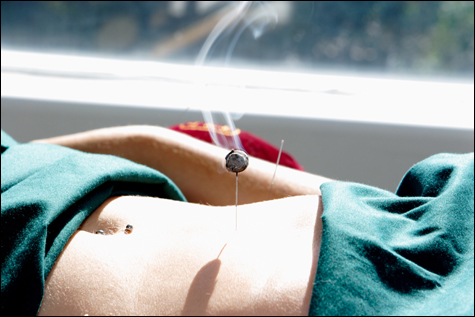
BURNING MUGWORT Mounted on a needle, the herb is used in an acupuncture procedure called “moxibustion.” |
According to massage therapist Mea Tavares, I have a lot of air in my system. During a holistic polarity session at the private practice studio he shares in South Portland (during which water-warmed crystals were balanced at points along my spine), Tavares visualized my energy as a hanging plant in a floating basket. "From there," he told me after our session, "the task became to give that plant some footing." In practical terms, this involved Tavares massaging and redirecting the energy from the muscular tensions in my upper body to the lower half. I've always known I could be a bit flighty, but this particular experience was eye-opening. (If for no other reason than that it had been the first health-care feedback I'd received from a licensed professional in several years.)
While finding my inner plant some footing is my own concern, Tavares's vision works both ways. With an influx of certified providers entering a struggling economy, Portland's newly cultivated network of alt-health practitioners is looking for a complex root system of its own.
Fewer Americans have private health insurance today than at any point in the modern era. And the price of employer-offered insurance is rising while the scope of its coverage contracts. In Maine, the completely uninsured tally at 15 percent. Although this figure is in line with the New England average, those who are presently insured face other challenges.
A 2008 study by the New America Foundation estimates that by 2016 the national average cost of family employer-sponsored health insurance will top $24,000, an 83 percent increase over 2008 premium levels. The same study found that in Maine, family insurance purchased through an employer will cost $30,142 in 2016, an increase of 144 percent above 2006 premium costs. It would consume 58.4 percent of the projected Maine median family income.
If the financial incentive for Mainers to stay healthy is greater than ever, Portland's growing alternative health care industry may be becoming its strongest resource. And now more than ever, Portland is seeing its practitioners meet its residents halfway.
'THE NEED IS THERE'
While retail and manufacturing jobs have been in steady recline, the rate of licensed alternative health care practitioners in the state has been slowly increasing each year. So far in 2010, the state has issued 240 new massage licenses (an increase from 192 in all of 2007), bringing Maine's total of licensed massage therapists to 2434. Meanwhile, Maine Medical Center has recently opened an integrative medicine program (following a national trend set at Harvard Medical School and the Mayo Clinic), suggesting local support for the field of alternative health practices is gaining traction. State labor statistics number the city's massage therapists at a mere 110, but that a figure doesn't account for a good portion of Portland's expanding web of holistic private practices — a development that is suffusing a national health care stand-off with a variety of local options.
"Portland is definitely saturated with massage therapists," says Andrea Spencer, who co-operates Apple Core Massage Therapy from a studio in the Old Port. "The thing is, I don't know how many people are actually getting massages."